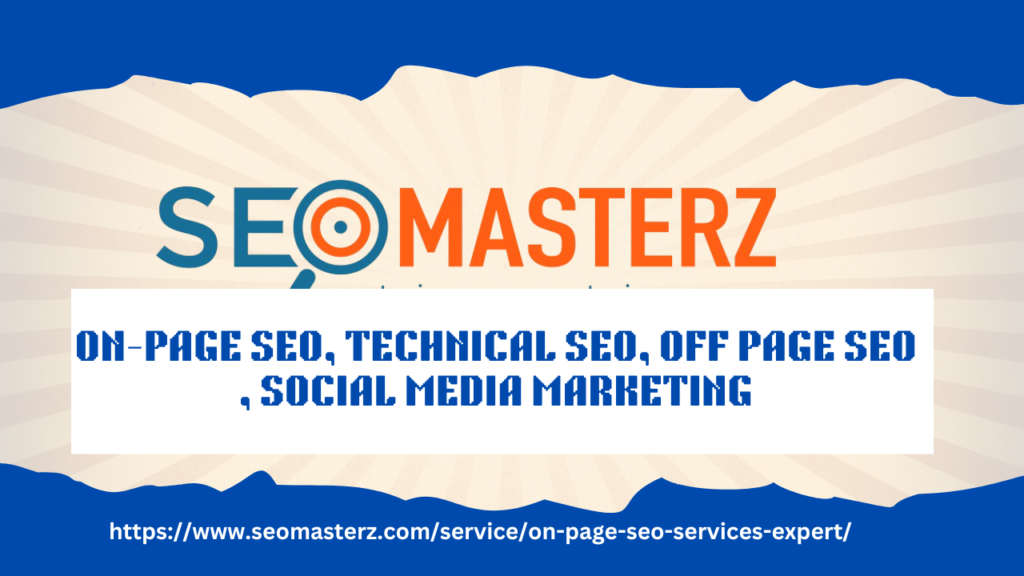In the rapidly evolving digital landscape, ensuring that your website is visible to search engines and potential customers is crucial for success. This is where On-Page SEO Optimization Services come into play. These services focus on improving individual web pages to rank higher and earn more relevant traffic from search engines. Whether you’re a business owner, a marketer, or a website developer, understanding the importance of on-page SEO can significantly impact your online visibility and conversion rates.
What is On-Page SEO?
On-page SEO refers to the practice of optimizing web pages to improve their search engine rankings and drive organic traffic. This involves both content and HTML source code optimization to make your website more attractive to search engines like Google, Bing, and Yahoo. Unlike off-page SEO, which focuses on external factors like backlinks, on-page SEO focuses on elements that you control directly within your website.
Key Elements of On-Page SEO Optimization
- Content Optimization High-quality, relevant content is the foundation of on-page SEO. Optimizing content involves using targeted keywords naturally throughout the text, creating informative and engaging articles, blogs, or product descriptions, and ensuring that the content answers the search intent of your target audience.
- Title Tags and Meta Descriptions Title tags are critical for both users and search engines as they define the title of a webpage. Meta descriptions, although not a direct ranking factor, influence click-through rates (CTR) by providing a concise summary of the page’s content. Optimizing these elements with keywords and a compelling call-to-action can greatly improve your search visibility.
- Header Tags (H1, H2, H3, etc.) Proper use of header tags helps organize content for both users and search engines. The H1 tag should include the primary keyword and give a clear indication of the page’s subject. Subsequent headers (H2, H3, etc.) break the content into sections and improve readability, making it easier for search engines to understand the structure of your content.
- Keyword Placement Strategic placement of keywords throughout the page is crucial. Keywords should appear in the title, URL, meta description, headers, and body content. However, avoid keyword stuffing, as this can lead to penalties from search engines. The goal is to create a natural flow that enhances user experience.
- URL Structure A clean and concise URL structure is another essential component of on-page SEO. URLs should be easy to read and include relevant keywords. This not only helps search engines index your pages more efficiently but also improves user experience by making URLs more descriptive and understandable.
- Internal Linking Linking to other relevant pages on your website helps distribute link equity, encourages users to explore more content, and enhances your website’s overall SEO health. Internal linking also improves crawlability, making it easier for search engines to discover and index new content.
- Image Optimization Images are an important aspect of on-page SEO that often gets overlooked. Ensuring that images have descriptive filenames, alt text, and are compressed for faster loading speeds can improve both user experience and search engine rankings.
- Mobile Responsiveness With more than half of web traffic coming from mobile devices, having a mobile-responsive design is a crucial ranking factor. On-page SEO optimization includes ensuring that your website is mobile-friendly, providing a seamless experience across all devices.
- Page Load Speed A slow-loading page can drastically affect user engagement and rankings. Optimizing your website’s load speed by compressing images, leveraging browser caching, and minimizing HTML, CSS, and JavaScript files is critical for better performance.
- Schema Markup Schema markup is a form of microdata that helps search engines understand the context of your content. Adding schema can enhance your search results with rich snippets, improving CTR and providing users with more information at a glance.
Why On-Page SEO Optimization Services are Essential
The primary goal of on-page SEO optimization services is to improve your website’s search engine rankings and user experience. Here’s why investing in professional on-page SEO services is a smart move:
- Increased Visibility: By optimizing key elements such as keywords, titles, and headers, your website is more likely to rank higher in search engine results pages (SERPs), driving more organic traffic.
- Better User Experience: On-page SEO also focuses on improving the usability of your website. A well-structured, fast-loading, and mobile-friendly site provides a better experience for users, increasing the chances of conversion.
- Higher ROI: Unlike paid advertising, on-page SEO delivers long-term benefits. Once your pages are optimized, they continue to drive traffic without additional costs, making it a cost-effective marketing strategy.
- Stay Competitive: Search engines constantly update their algorithms. Professional SEO services ensure that your website stays up-to-date with the latest best practices, helping you maintain or improve your rankings over time.

On-page SEO optimization services are crucial for any business looking to boost its online presence. By focusing on optimizing content, metadata, keywords, and overall site structure, you can ensure that your website ranks higher, attracts more visitors, and delivers a better user experience. Whether you’re starting from scratch or looking to enhance an existing website, investing in on-page SEO is an essential step in building a successful online strategy.












